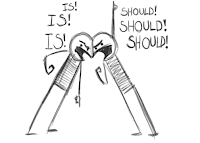Exciting news which has been getting in the way of this blog - I'm the new editor of the
La Leche League New Zealand magazine! (The only way this would be cooler is if it paid lots of money, but the cause is well worth my time.) For those of you enjoying my blog regularly, thank you because I've felt creatively unblocked and who knows whether I'd have fronted up for scary new opportunities...
So I am minimising other things, like my Facebook checking and double-checking (to see if anything interesting has happened), and I have several blog idea posts brewing but as yet unwritten. But one thing I'm making sure to get in these days is my exercise.
Evolution of exercise...
We'll skip the part where I used to fool my gym teacher regularly during running by faking a contact lens emergency. She
was fooled, right? Or was she paid too little to care if I cheated myself out of improved physical health...? I'll leave that question to the childcarers among us, of all income levels.
At university, I was up and down with exercise levels and fitness, but I never did anything organised. With my first office job (and my spreading office chair bottom), I joined a gym because that's what you do when you have an income and want to get fit, right? Plus, it gave me something to do with my evenings. Sad to say, this was necessary. And I worked out
lots!
But the gym and the workouts were boring. It must have done some good, but I continued to be very overweight throughout my gym period. Changing my
diet - 1, expensive gym membership, 0. Although my exercise routine has evolved, I have always found an enjoyable cornerstone in walking.
- In this, I have obediently followed the cliche of turning into my mother, who is busy turning into my grandmother, a mighty lifelong walker indeed. And I sincerely hope to visit the USA again before my grandmother turns into her mother, who is, of course, dead. Hope this isn't too blunt - I need to be real about this so I remember how important it is. We are a long-lived family (great-grandma was something like 94) but I don't want to push my luck.
Walking is reported as the most common exercise for
successful longterm weight losers (for which I still qualify if imperfectly). When I had reached quite a comfortable weight, I enjoyed rockclimbing and regular morning runs (both quite difficult to do when you're carrying too much extra).
Post-baby: I walked
lots - death marches with Alex in a pram around our local park (so he would spend at least some time asleep not physically attached to me). This wound down, especially after Nadia was born, to not enough exercise at all due to exhaustion. Very recently, with improved sleep, this has also improved to great long walks and even runs down to the beach, but never often enough!
I realised that the real challenge of the journey was the hill just outside our cul-de-sac. The rest, while pleasant, was more of a meditative stroll (unless I really racewalked). So I minimised again, and now perform the daily ritual of hauling ass up and down Hawera Hill a couple of times at my top speed (which is now running, except the steepest uphill bits. It isn't a bad little workout before breakfast, while DH wrangles the kids through breakfast. And I do it, rain or shine. So far.
I love mornings
Studies often promote
morning exercise as particularly effective. And what I always loved about my morning dashes is that it's straight from my nightie into my workout clothes, then into the shower and cleaned up for the public. What a timesaver - why clean up and dress once in the morning and then
again after a later workout?
Reduced healthcare costs
Exactly when I started getting out every day, I delayed my regular fortnightly chiropractic visit for one more week - and have maintained that
50% improvement ever since. This is a big deal, since I've been addicted to the great feeling of chiropractic care since a sudden crippling pain seized me more than a decade ago, and a series of practitioners have tried to wean me to less frequent visits in the past. There is a combination of reasons for my problems, but there's also no way to deny it. You can't just say "I must get some exercise", YOU MUST GET SOME EXERCISE!
More minimalist exercise
What about a
marathon?
Wow, running
barefoot!
Hitting the
trail...























